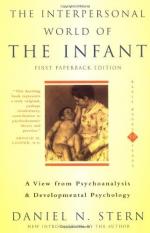
|
| Name: _________________________ | Period: ___________________ |
This test consists of 5 multiple choice questions, 5 short answer questions, and 10 short essay questions.
Multiple Choice Questions
1. Stern asserts that infants in the emergent stage have _______ and cognitive processes that are not easily separated.
(a) Affective.
(b) Somatic.
(c) Reactive.
(d) Prospective.
2. The developmentalist picture helps to account for the lack of differentiation of experience including ______.
(a) Disturbed sleep patterns.
(b) Problems digesting food.
(c) Integrated social events.
(d) Confused social events.
3. Hypothesizing about infant experience requires the use of an unobserved "_____ quality" in order to make an inference.
(a) Known.
(b) Seen.
(c) Objective.
(d) Felt.
4. Stern describes several realms of experience without making any of them primary including all of the following except ______.
(a) Pleasure.
(b) Heuristic tone.
(c) Hedonic tone.
(d) Discrete categories of affect.
5. There is little evidence showing that psychological insults and ______ at one age predict later clinical problems.
(a) Attitudes.
(b) Trauma.
(c) Ideas.
(d) Development.
Short Answer Questions
1. Self-_________ becomes tied to the behaviors of the self-regulating other because they occur together.
2. The physical self or _______, is experienced as coherent, willful, and a physical entity relying on interpersonal capacities.
3. Self-___________ involves the sense of self that experiences affects and emotions, according to the author's findings.
4. One of the major parts of the emergent self has to do with _______ drawn between particular experiences.
5. __________ enables identifying what property belongs to which person, according to the author, which prevents the two core selves from getting confused.
Short Essay Questions
1. What do caregivers of an infant do as a result of the infant seeing others as self-regulating, according to the content of the book?
2. What are some of the many forms of what might be called the self, according to this book?
3. What does Stern say is the definition of the clinical infant as will be described and used in parts of this book?
4. What may always be too much for the behavioral sciences, though it must still be theorized about?
5. What happens as a result of infants having a central disposition to create and test the hypotheses of the world?
6. What is the goal of the book in its exploration of the subjective life of infants, according to the content of the book?
7. What does research show about infants and the experience of intersubjective stages in others, according to the content of the book?
8. What is the observed view of infancy, a dialogue that continues throughout the book?
9. What have a number of revolutions in collecting information done for the study of infants?
10. How does psychoanalysis define progressive reorganizations of infant psychology, according to the content of the book?
|
This section contains 626 words (approx. 3 pages at 300 words per page) |

|




